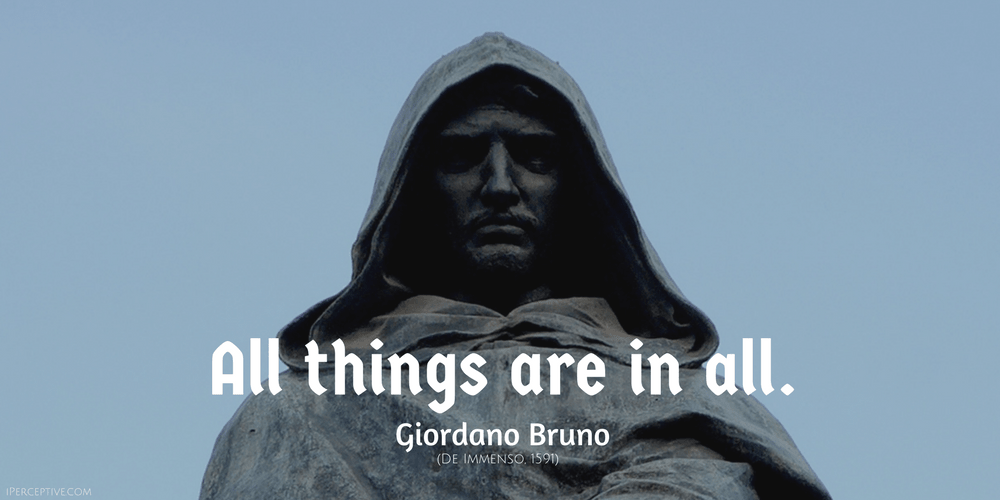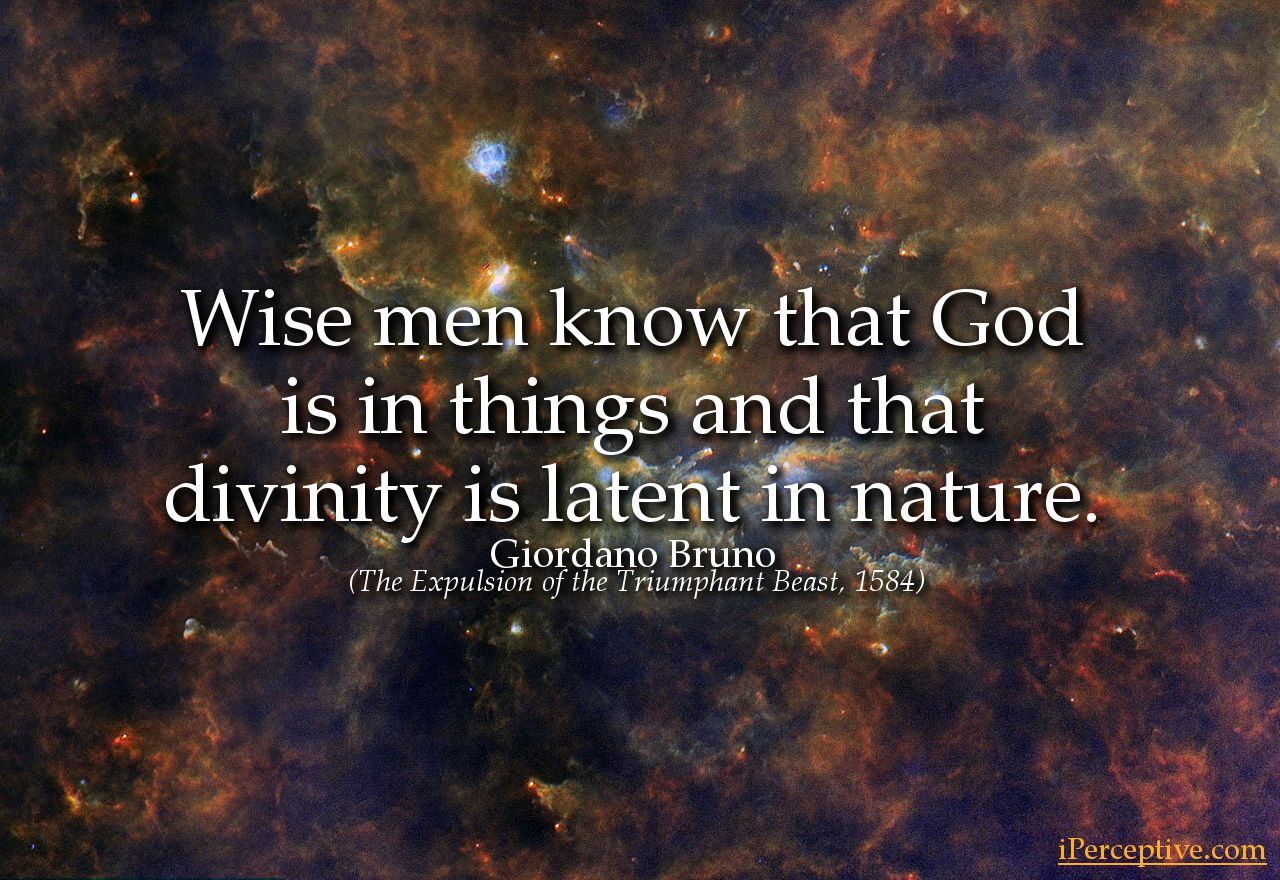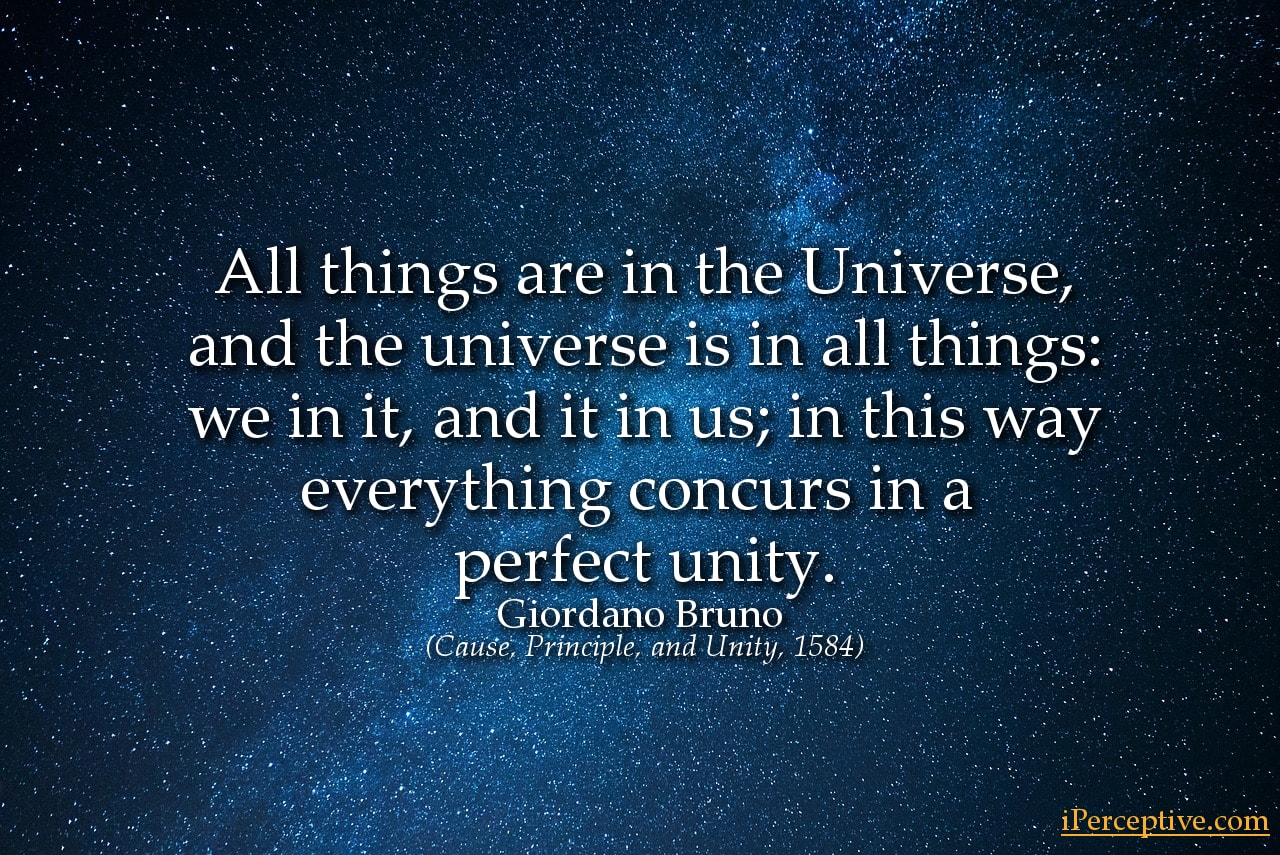Giordano Bruno Quotes

All things are in all.
The Universe is one, infinite, immobile.
Nature is none other than God in things...
If it is not true it is very well invented.
Time is the father of truth, its mother is our mind.
There is in the universe neither center nor circumference.

Wise men know that God is in things and that divinity is latent in nature.
For nature is not merely present, but is implanted within things, distant from none...
Perchance you who pronounce my sentence are in greater fear than I who receive it.
Divinity reveals herself in all things... everything has Divinity latent within itself.
Nothing of the eternal incorporeal substances ever changes or deforms.. therefore it cannot be said to die.
The wise soul feareth not death; rather she sometimes striveth for death, she goeth beyond to meet her.
The fools of the world have been those who have established religions, ceremonies, laws, faith, rule of life.
The Divine Light is always in man, presenting itself to the senses and to the comprehension, but man rejects it.

All things are in the Universe, and the universe is in all things: we in it, and it in us; in this way everything concurs in a perfect unity.
The single spirit doth simultaneously temper the whole together; this is the single soul of all things; all are filled with God.
We delight in one knowable thing, which comprehends all that is knowable; in one apprehensible, which draws together all that can be apprehended; in a single being that includes all, above all in the one which is itself the all.
Because the soul always desires to love more than it loves and to see more than it sees. Moreover the soul desires that this species which the sight has engendered in it should not become attenuated, enfeebled, or lost.
It is proof of a base and low mind for one to wish to think with the masses or majority, merely because the majority is the majority. Truth does not change because it is, or is not, believed by a majority of the people.
I cleave the heavens and soar to the infinite.
And while I rise from my own globe to others
And penetrate ever further through the eternal field,
That which others saw from afar, I leave far behind me.
God is infinite, so His universe must be too. Thus is the excellence of God magnified and the greatness of His kingdom made manifest; He is glorified not in one, but in countless suns; not in a single earth, a single world, but in a thousand thousand, I say in an infinity of worlds.
There is a single general space, a single vast immensity which we may freely call void: in it are unnumerable globes like this on which we live and grow, this space we declare to be infinite, since neither reason, convenience, sense-perception nor nature assign to it a limit. In it are an infinity of worlds of the same kind as our own.
They dispute not in order to find or even to seek Truth, but for victory, and to appear the more learned and strenuous upholders of a contrary opinion. Such persons should be avoided by all who have not a good breastplate of patience.
There is no absolute up or down, as Aristotle taught; no absolute position in space; but the position of a body is relative to that of other bodies. Everywhere there is incessant relative change in position throughout the universe, and the observer is always at the center of things.
The beginning, middle, and end of the birth, growth, and perfection of whatever we behold is from contraries, by contraries, and to contraries; and whatever contrarity is, there is action and reaction, there is motion, diversity, multitude, and order, there are degrees, succession and vicissitude.
Even to have come forth is something, since I see that being able to conquer is placed in the hands of fate. However, there was in me, whatever I was able to do, that which no future century will deny to be mine, that which a victor could have for his own: Not to have feared to die, not to have yielded to any equal in firmness of nature, and to have preferred a courageous death to a noncombatant life.
Here am I miserable, deprived of a heart, abandoned by my thoughts, bereft of the hope I had entirely placed in them. Nothing else remains but the sense of my poverty, unhappiness, and wretchedness. And what am I not deprived of this sense too? Why does death not come to my aid, now that I am deprived of life? For what purpose are my natural faculties deprived of their power?
In this manner, although the soul at first launches complaints against its heart and thoughts, it now desires to be raised with them and manifestly deplores the union and familiarity contracted with corporeal matter. Leave me then, it cries, corporeal life, and do not trouble me, so that I may reascend to my native home, to my sun.
Here the sorrowing soul, not in real discontent, but in the passion of a certain amorous martyrdom, speaks as though addressing its discourse to those who are similarly impassioned. It has dismissed its heart, as it were, against its will, for the heart directs its course toward an impossible goal, extends itself where it cannot reach and would embrace what it cannot grasp; and the more the heart is estranged from the soul, the more does it enkindle itself toward the infinite.
This entire globe, this star, not being subject to death, and dissolution and annihilation being impossible anywhere in Nature, from time to time renews itself by changing and altering all its parts. There is no absolute up or down, as Aristotle taught; no absolute position in space; but the position of a body is relative to that of other bodies. Everywhere there is incessant relative change in position throughout the universe, and the observer is always at the center of things.
Behold in the candle borne by this Chandler, to whom I give birth, that which shall clarify certain shadows of ideas ... I need not instruct you of my belief. Time gives all and takes all away; everything changes but nothing perishes. One only is immutable, eternal and ever endures, one and the same with itself. With this philosophy my spirit grows, my mind expands. Whereof, however obscure the night may be, I await the daybreak, and they who dwell in day look for night ...
It is manifest... that every soul and spirit hath a certain continuity with the spirit of the universe, so that it must be understood to exist and to be included not only there where it liveth and feeleth, but it is also by its essence and substance diffused throughout immensity... The power of each soul is itself somehow present afar in the universe... Naught is mixed, yet is there some presence.
Anything we take in the universe, because it has in itself that which is All in All, includes in its own way the entire soul of the world, which is entirely in any part of it.
In exercising its faculty, then, the mind can desire an object only to the extent that it is near, proximate, known and familiar to it. Thus a pig cannot wish to be a man nor desire anything appropriate to the appetite of a man. He prefers to wallow in the mud rather than in a bed of fine linen; he would sooner mate with a sow than with the most beautiful woman nature produces, because the desire conforms to the nature of the species.
This is a beauty which comes and goes, is born and dies, blooms and decays; and is eternally beautiful for so very short a moment and within itself truly and lastingly contains a cargo, a store-house, an emporium, a market of all the filth, toxins and poisons which our step-mother nature is able to produce; who having collected that seed of which she makes use, often recompenses us by a stench, by repentance, by melancholy, by languor, by a pain in the head, by a sense of undoing, by many other calamities which are evident to everyone, so that one suffers bitterly, where formerly he suffered only a little.
Unless you make yourself equal to God, you cannot understand God: for the like is not intelligible save to the like. Make yourself grow to a greatness beyond measure, by a bound free yourself from the body; raise yourself above all time, become Eternity; then you will understand God. Believe that nothing is impossible for you, think yourself immortal and capable of understanding all, all arts, all sciences, the nature of every living being. Mount higher than the highest height; descend lower than the lowest depth. Draw into yourself all sensations of everything created, fire and water, dry and moist, imagining that you are everywhere, on earth, in the sea, in the sky, that you are not yet born, in the maternal womb, adolescent, old, dead, beyond death. If you embrace in your thought all things at once, times, places, substances, qualities, quantities, you may understand God.

